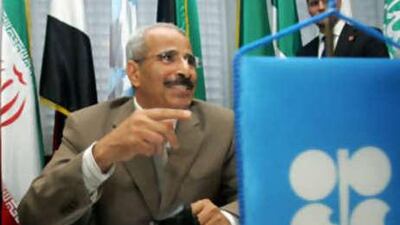VIENNA // Leading members of Opec may move to reduce production if oil prices break substantially below US$100 a barrel in the coming weeks, analysts and former Opec officials said yesterday. Ministers of Saudi Arabia and the UAE greeted the recent 30 per cent slide in prices, which left New York futures at $104.77 a barrel yesterday, as a welcome relief for the ailing world economy.
And Opec, which controls 40 per cent of the world's oil supply, was expected at press time to leave its formal output ceiling unchanged at last night's meeting in Vienna. But the group was already drawing up plans to respond to any further substantial drop. Alirio Parra, a former president of Opec and Venezuelan energy minister, said ministers would probably call an emergency meeting to discuss reducing supply before prices reached $80 a barrel.
"The point at which Opec would act would be when the marginal barrel finds resistance in the market at the going price. In my opinion that would be below $100," he said. Nordine Ait-Laoussine, a former Algerian oil minister, said each country in Opec had a different price floor, depending on the needs of their individual budgets weighed up against their concerns for the impact of high prices on the world economy.
"The range would be $80 to $100 a barrel," he said. Saudi Arabia increased its exports during the summer in response to prices hitting a record above $147 a barrel. The world's largest producer argued that the price surge was driven largely by factors outside Opec's control, such as speculative buying on futures markets, a weak dollar and growing investor appetite for commodities as an inflation hedge.
But the kingdom nevertheless wanted to avoid accusations that it was stoking a price shock that has contributed to inflation and recession in much of the industrialised world. Now that prices are back near $100, analysts said factors such as supply and demand were reasserting themselves over market psychology, giving Opec a renewed sense of power. "The market sentiment is now in Opec's favour because the trend is bearish and more focused on supply and demand," said Raad Alkadiri, a consultant at PFC Energy in Washington.
A minority in Opec regards $100 as a magic number that should represent the new price floor, said Mr Ait-Laoussine. But even those employing a more rational economic analysis still put the floor well above $50 a barrel - a price last witnessed less than two years ago. "Some think $100 is a magic number, but others look at the cost of the marginal barrel and estimate it at $70 to $90 a barrel for tar sands in Canada," said Mr Ait-Laoussine. Oil extracted from Canada's tar sands is among the most expensive crude on the world market.
Ali al Naimi, the Saudi oil minister, earlier this year estimated that the cost of producing renewable fuels had introduced a new price floor at $60 to $70 a barrel, while Iran said prices should not go below $80 a barrel. "International oil companies say that producing a barrel of crude in some new fields costs $80, so the oil prices cannot be lower than this considering a reasonable profit for production," said Iran's Opec representative, Mohammad Ali Khatibi.
These theories could soon be put to the test. Opec's data show that if its 13 members continue to pump at current levels, the global market will be oversupplied by a million barrels next year. "If Opec does not do anything, the price will continue to decline," said Mr Ait-Laoussine. "Some in Opec are not convinced that we are at the end of the era when prices were driven by speculation. "But we will get to the point, whether in the next few months or next year," he added.
tashby@thenational.ae

